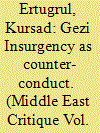| Srl | Item |
| 1 |
ID:
186932


|
|
|
|
|
| Summary/Abstract |
This article defines the Gezi insurgency as a case of ‘counter-conduct’ with a heterotopia in a Foucauldian sense and compares it with similar movements to underline its peculiarity. It argues that Gezi cannot be defined as an ‘anti-austerity’ or ‘anti-dictatorship’ movement. Rather, it was a struggle against the neoliberal-cum-neoconservative conduct under AKP rule and its leadership taking the form of a pseudo-presidential regime. Gezi not only was a search for a different conduct but also a possible self-conduct through self-invention in prefigurative experimentations with different ways of being and practicing direct democracy in the reclaimed public spaces that characterized the action process. What sustained this counter-action process was the spontaneous constitution or deployment of certain platforms like Blok and Çarşı which did not, in themselves, express or represent any given social or political organization nor a corresponding form of a generic identity. In the Gezi insurgency, actors tended to outflow their defining social categories and become a part of the series of performances in which a sense of self-transformation has been common.
|
|
|
|
|
|
|
|
|
|
|
|
|
|
|
|
| 2 |
ID:
184070


|
|
|
|
|
| Summary/Abstract |
Worker co-operatives generally embrace democracy in their ownership and decision-making structure. However, the commitment to a flat organisational hierarchy, implementation of equal wage policy, and the pursuit of a strong ethical policy position these co-operatives on the highly principled side of the co-operative landscape in the UK. This paper draws on an ethnographic study of five such principled workers’ co-operatives operating in a most adverse economic context, the UK capitalist market economy. The study explores collective decision-making and the personal investment as two important political aspects. Workplace democracy and the personal are interlinked paradigms for political praxis – as practiced democracy, immanent critique of the hegemonic corporate way of organising work, as well as prefiguring a viable alternative. Taking the perspective of radical worker co-operatives, this article caters to an urgently needed conceptualisation of radical democratic citizenship at work.
|
|
|
|
|
|
|
|
|
|
|
|
|
|
|
|